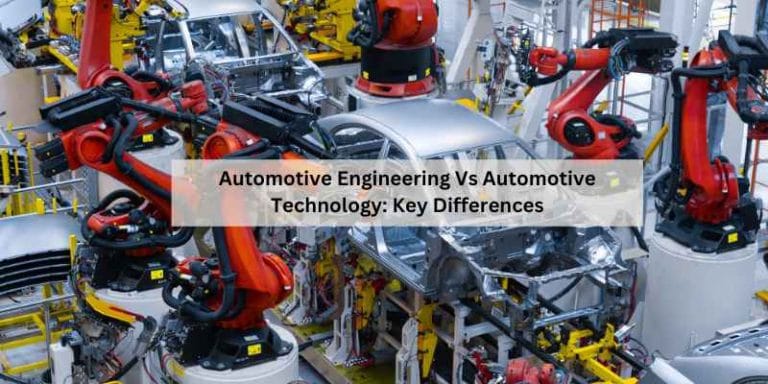Automotive Engineering vs. Tech: Unveiling Key Distinctions
Automotive engineering focuses on designing and manufacturing all motor vehicles, while automotive technology involves repair and maintenance using computers and technology. Both fields are essential in the automotive industry, with engineers responsible for innovation and technicians for hands-on work.
Pursuing a career in automotive engineering or technology offers exciting opportunities to contribute to the advancement of transportation technologies and ensure the efficiency and safety of vehicles on the road. Whether you are interested in developing cutting-edge vehicle designs or diagnosing and fixing mechanical issues, the automotive sector provides a dynamic and rewarding environment for those passionate about cars and technology.
Let’s explore the nuances between these two interconnected yet distinct fields within the automotive industry.
Introduction To Automotive Fields
When it comes to the automotive industry, there are two key fields that play a vital role in shaping the future of transportation: automotive engineering and automotive technology. Each field offers distinct areas of expertise and career opportunities. Let’s delve into the differences between the two and gain a better understanding of what sets them apart.
Defining Automotive Engineering
Automotive engineering involves the application of mechanical, electrical, electronic, software, and safety engineering principles to design, manufacture, and operate vehicles. It encompasses a broad range of skills and knowledge, including vehicle dynamics, powertrain systems, aerodynamics, and materials science. Automotive engineers are responsible for developing innovative solutions to enhance vehicle performance, fuel efficiency, and safety standards.
Understanding Automotive Technology
On the other hand, automotive technology focuses on the practical aspects of maintaining, diagnosing, and repairing vehicles. Professionals in this field are equipped with the expertise to handle complex automotive systems, including engine diagnostics, electronic systems, and advanced vehicle technologies. They play a crucial role in implementing cutting-edge automotive advancements and ensuring the proper functioning of modern vehicles.
Educational Pathways
Automotive Engineering focuses on designing and manufacturing all types of vehicles, while Automotive Technology deals specifically with the repair and maintenance of vehicles using advanced technology and computer diagnostics. Both fields offer unique career paths in the automotive industry.
Degrees In Automotive Engineering
In the field of automotive engineering, pursuing a degree can provide you with a comprehensive understanding of the design, construction, and manufacturing processes involved in creating various automotive assemblies and components. A Bachelor’s degree in Automotive Engineering Technology is a common choice, offering specialized courses that focus on automotive systems, vehicle dynamics, and powertrain design. Some colleges and universities also offer Bachelor’s degrees in Mechanical Engineering with concentrations or minors in automotive areas.
Certifications In Automotive Technology
On the other hand, automotive technology primarily focuses on the practical aspects of vehicle maintenance and repair. While a degree in automotive engineering provides a broader knowledge base, certifications in automotive technology can be a valuable asset for individuals looking to specialize in specific areas of automotive repair and diagnostics. These certifications, such as Automotive Service Excellence (ASE) certifications, demonstrate your expertise in areas such as engine repair, electrical systems, and brake systems.
Choosing between a degree in automotive engineering or certifications in automotive technology depends on your career goals and interests. If you are passionate about the design and manufacturing aspects of vehicles, a degree in automotive engineering may be the right path for you. However, if you are more inclined towards hands-on repair and maintenance work, pursuing certifications in automotive technology can provide you with the necessary practical skills.
Scope Of Work
Engineer’s Role In Vehicle Design
Automotive engineers focus on designing and developing vehicles.
Technician’s Focus On Diagnostics
Automotive technicians specialize in diagnosing and repairing vehicle issues.
Technical Skills Required
When considering the difference between automotive engineering and automotive technology, it’s essential to understand the technical skills required for each discipline. Both fields demand a combination of engineering expertise and technological proficiencies, albeit with distinct focuses.
Engineering Expertise
Automotive engineering necessitates a strong foundation in traditional engineering disciplines such as mechanical, electrical, and materials engineering. This expertise is crucial for designing, developing, and testing vehicle components and systems.
Technological Proficiencies
On the other hand, automotive technology revolves around mastery of advanced technologies used in modern vehicles. This includes proficiency in computer diagnostics, electronic systems, and vehicle communication networks.
Career Outlook
Automotive Engineering involves designing and manufacturing all types of vehicles, while Automotive Technology focuses on vehicle maintenance and repair using advanced technology. Automotive engineers innovate vehicle technologies, whereas auto technicians utilize technology for diagnostics and repairs.
If you’re considering a career in the automotive industry, it’s important to understand the differences between automotive engineering and automotive technology. While both fields involve working with vehicles, they have different focuses and career paths. Let’s take a closer look at the career outlook for each field.
Job Opportunities in Engineering
Automotive engineering involves designing and developing new vehicles and vehicle components. This field requires a strong foundation in math and science, as well as knowledge of engineering principles and design software. Career opportunities in automotive engineering include:
– Automotive Design Engineer
– Manufacturing Engineer
– Quality Control Engineer
– Research and Development Engineer
Employment Prospects in Technology
Automotive technology, on the other hand, involves repairing and maintaining vehicles. This field requires knowledge of computer diagnostics and repair, as well as traditional mechanical skills. Career opportunities in automotive technology include:
– Automotive Service Technician
– Automotive Diagnostic Technician
– Automotive Body and Glass Repairer
– Automotive Electrician
According to the Bureau of Labor Statistics, both fields are expected to see job growth in the coming years, with employment of automotive service technicians and mechanics projected to grow 6% from 2019 to 2029, and employment of mechanical engineers projected to grow 4% from 2019 to 2029.
In conclusion, choosing between automotive engineering and automotive technology depends on your interests and skills. Both fields offer rewarding careers with job growth potential.
Industry Evolution
Advancements in Engineering:
Automotive engineering involves designing and manufacturing vehicles.
Innovations in Technology:
Automotive technology focuses on the application of tools and systems.
Advancements In Engineering
- Automotive engineering designs and constructs various vehicle types.
- Engineers focus on enhancing vehicle performance and safety.
- Continuous research leads to improved fuel efficiency and sustainability.
Innovations In Technology
- Automotive technology integrates advanced diagnostic tools and systems.
- Technicians rely on computerized solutions for vehicle maintenance.
- Technological advancements streamline repair processes for efficiency.
Real-world Applications
When it comes to real-world applications, both automotive engineering and automotive technology play crucial roles in shaping the transportation industry. Let’s delve into the specific areas where these disciplines make a tangible impact.
Engineering Projects In Transportation
Automotive engineering involves the design, development, and production of vehicles, such as cars, trucks, buses, and motorcycles. Engineers in this field are responsible for creating innovative solutions to enhance vehicle performance, safety, and efficiency. They collaborate on projects related to aerodynamics, fuel efficiency, and advanced materials to improve the overall driving experience.
Technological Solutions In Automotive Repair
On the other hand, automotive technology focuses on the practical application of technological advancements in vehicle maintenance and repair. Automotive technicians utilize diagnostic tools, computer systems, and specialized equipment to troubleshoot and fix mechanical and electronic issues in modern vehicles. These professionals play a critical role in ensuring that automobiles remain safe and reliable for daily use.
Making The Choice
Automotive engineering and automotive technology are two distinct fields that are often confused. While automotive engineering focuses on the design, construction, and manufacture of various automotive assemblies and components, automotive technology deals with the diagnosis and repair of vehicles using computers and technology.
So, if you want to work on the design and manufacture of cars, automotive engineering is the right choice for you, but if you prefer to diagnose and repair vehicles, automotive technology is the better option.
Factors To Consider For Aspiring Engineers
Automotive engineering and automotive technology both offer exciting career paths, but it’s essential to consider various factors when deciding which field to pursue.
- Passion for designing and creating innovative automotive systems
- Interest in advanced research and development in the automotive industry
- Desire to specialize in vehicle dynamics, powertrain systems, and autonomous technology
- Goal to contribute to the future of sustainable transportation
Guidance For Future Technicians
For those interested in a career as automotive technicians, certain considerations can help make an informed decision:
- Eagerness to diagnose and repair complex automotive issues
- Interest in utilizing cutting-edge diagnostic tools and computerized systems
- Passion for hands-on work and troubleshooting mechanical and electrical problems
- Desire to specialize in specific automotive systems, such as brakes, transmissions, or HVAC
Frequently Asked Questions
Which Is Better, Automotive Or Automobile Engineering?
Automotive engineering covers all motor vehicles, while automobile engineering focuses specifically on cars. Both have distinct career paths.
What Is The Difference Between Automotive Technology And Mechanic?
Automotive technology focuses on the use of computers and technology to diagnose and repair vehicles, while a mechanic traditionally uses hand tools to troubleshoot and fix car issues. Automotive technology incorporates advanced systems and electronics, while mechanics typically work on general repairs.
What Degree Is Best For Automotive?
The best degree for automotive is a Bachelor’s in Automotive Engineering Technology or Mechanical Engineering with automotive concentrations.
Is Automotive Technician Worth It?
Yes, becoming an automotive technician is worth it as it offers valuable knowledge and skills that can be used outside of the automotive industry. Automotive technicians are repair shop wizards who diagnose vehicle problems using computers and technology, making it a promising career with a rapidly changing and evolving industry.
It is a viable option for those interested in the automotive field and can lead to a successful career.
Conclusion
The difference between automotive engineering and automotive technology lies in their focus. Automotive engineering involves the design, construction, and manufacture of various automotive assemblies and components, while automotive technology emphasizes the use of computers and technology for diagnosis and repair.
Both fields offer valuable knowledge and skills, with automotive engineering providing a broader scope and automotive technology specializing in the use of technology for vehicle maintenance. Whether pursuing a career in automotive engineering or automotive technology, both paths offer exciting opportunities in the ever-evolving automotive industry.







